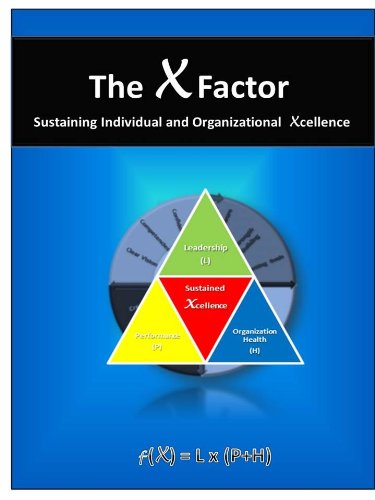Author’s Corner
The "X" Factor: Sustaining Personal and Organizational Xcellence
Major General (Retired) Keith Thurgood, Ph.D.
Major General (Retired) Keith Thurgood, Ph.D.
Leadership: /ˈlēdərˌSHip/ noun , the action of leading a group of people or an organization: different styles of leadership; the state or position of being a leader: the leadership of the party
A “noun”, really? For a word or idea that has had more written about it than virtually any other subject, it’s puzzling to understand why the world is full of leaders, but few are leading. I'll be the first to admit that what the world probably doesn't need is another book about leadership and change management. In fact, if you do a search on the internet using “leadership” or “leadership related” words, the search results in excess of 166 million sources of leadership and millions more references about leadership ideas, definitions and constructs. Warren Bennis stated the most important single underlying issue that we face today is a crisis in leadership. We write about it because we need it. Because leaders are critically important in sustaining excellence, it has a multiplicative impact on Xcellence or the X Factor. The X Factor is the combination of effective leadership, performance and organizational or personal health. All three of these capabilities are needed and must be developed and balanced to sustain Xcellence. It is the right combination of these three concepts that drive results, improve performance and grow leaders…in short, it is how individuals and organizations sustain Xcellence.
Most leaders, though well intended, aren’t consistent in their leadership philosophy or how they describe leadership. I discovered that most people don’t have a good way to summarize what they believe and why. When you ask a leader to describe their leadership philosophy you usually get a “list” of specific attributes or ideas. Lists are well and good as far as they go. In fact I actually like many of them and, if you boil them down to their essence they share many common themes. As good as they are, there is no silver bullet, magic wand, buzzword, flow chart, book or single idea that you can read and say “that’s what leadership is all about or, do these things and you are “leader.” But here’s the thing. They are all valuable, but the first and foundational point about leadership is that it is personal. The “lists” must be personalized to be effective and meaningful. For the most part the lists you read about are personal. They have been developed over a period of time and tested in the crucible of stress and action. What makes them great and unique is that the authors who have thought about their list, really thought about it, own them, and when they talk about them you can sense their passion and commitment. But, what is missing from most lists and statements of philosophy is the reason behind the list, the “why”, the connection to a larger purpose, reason or personal voice.
In that light, I have my own leadership principles, I call them my “Rules of the Road.” I’ve developed these four ideas and the accompanying concepts over a period of years for my team. I wanted them to remember, apply and effectively use these rules and ideas. I wanted them to internalize the concepts and more importantly begin to develop their own “rules of the road.”
In early 2001 when we were just kicking off the first Gulf War I spent a serious amount of time condensing my leadership “lists” into a few bit sized statements that I thought could be easily remembered and would be meaningful our Soldiers we were sending into harms way. Even in the military, which is the nation’s premiere institution for leadership development, and in the corporate world, I’ve found that most leaders haven’t taken the time to write down and connect in a meaningful way what they believe and why. I see “lists”…the “what”, but not the deeper reasoning or the “why.” This is a book about leadership…wrapped in a personal change management message. This installment is the first chapter on a book about a leadership philosophy.

"Your legacy is the people you develop. Have you developed the future?"
Colonel Patrick Sweeney, Ph.D.,(USA, Retired, USMA 1982)
More +
More +





